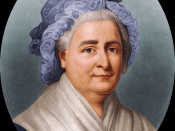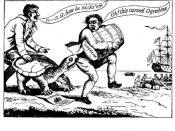Jefferson reasoned that the warring nations in Europe depended on the United States for certain raw materials and foods. Keeping this fact in mind congress passed the Embargo Act in 1807. This act forbade the exports of all goods from the United States. Jefferson thought since the foreign powers needed American goods, upon passing this act the warring nations would agree to respect America's neutral rights. The Embargo act was hated by the citizens of the states and was incredibly hard to enforce. The embargo was loosely enforced and turned out to be more detrimental than no embargo at all.
The northern and southern economy struggled under the embargo far before England or France felt its effects. New England's once bustling harbors were now empty. The soup kitchens were the only places thriving; they had lots of business feeding the unemployed. The excess of unexportable cotton, grain, and tobacco overwhelmed the South and West.
Their economy was struggling no less then that of New England. As a direct result of the Embargo Act a massive illegal trade began.
Jefferson unwittingly did a great deal for American manufacturing. With the docks tied up New England began to open up new factories and reopen old ones. New England eventually prospered from the ugly Embargo Act, but southern economy only perished.
England closed French ports to foreign shipping unless they first passed through English ports. Napoleon therefore retaliated by seizing all foreign ships that entered English ports. There was no way to trade with one nation without facing the other's wrath. Besides seizing merchant ships the British were also doing impressments.
Impressments were the forcible enlistment of sailors. From 1808 to 1811 six thousand United States citizens were impressed. Scores of them either died or were killed under the King's service. Friends...


